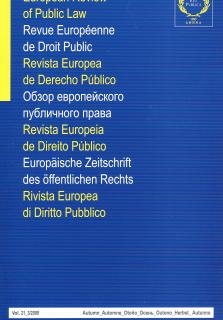
Constitutional Law / Droit constitutionnel
2008
Belgium / Belgique
Sénateur, Professeur émérite de l’Université catholique de Louvain
2008 is a year marked by a phenomenon of ministerial instability. Three Prime Ministers - Verhofstadt, Leterme and Van Rompuy - have succeded one another in less than one year. The period is not conducive to an intense constitutional and legislative activity. It is, however, necessary to point out the complex process of assent to the Lisbon Treaty, but not to the framework Convention for the protection of national minorities. The revision of Article 22 bis of the Constitution also allows to increase childrens’ rights. Two important public law questions fuel the political debate. First, the question on the granting of “residual jurisdictions”: should they refer to the federal State or should they be entrusted to the communities and regions? Second, the question on the definition of the revision procedure: should one institute more flexible rules of revision in order to allow a faster adaptation of the Constitution to the political, economic and social realities of the moment? The legislative activity on the community and regional level remains considerable.
L’année 2008 est marquée par un phénomène d’instabilité ministérielle. Trois Premiers ministres - Verhofstadt, Leterme et Van Rompuy - se succèdent en moins d’un an. La période n’est pas propice à une intense activité constitutionnelle et législative. Il y a lieu, cependant, de relever le processus complexe d’assentiment au traité de Lisbonne, mais pas à la convention-cadre sur la protection des minorités nationales. La révision de l’article 22 bis de la Constitution permet aussi d’augmenter les droits de l’enfant. Deux questions importantes de droit public alimentent le débat politique. La première est celle de l’octroi des “compétences résiduelles”: doivent-elles revenir à l’Etat fédéral ou être confiées aux communautés et régions? La seconde est celle de la définition de la procédure de révision: ne faut-il pas instaurer des règles plus souples de révision pour permettre des adaptations plus rapides de la Constitution aux réalités politiques, économiques et sociales du moment? L’activité législative aux niveaux communautaire et régional reste appréciable.





















